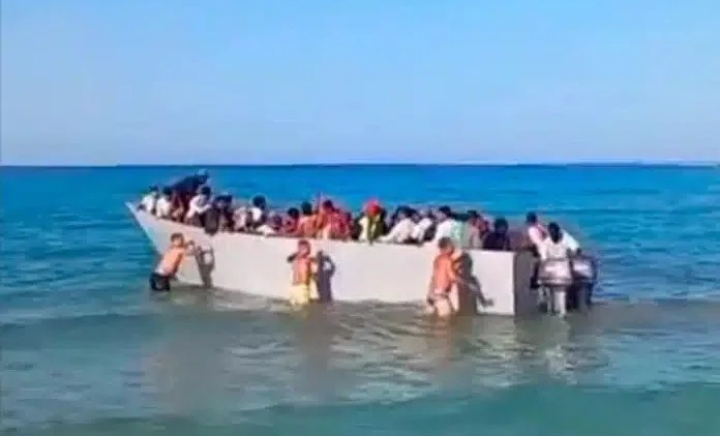Greek island beachgoers push migrant boat back to sea amid rising arrivals from Libya

Migrant Tensions Rise on Gavdos After Boat Pushed Back to Sea
A disturbing incident unfolded on the small Greek island of Gavdos when beachgoers were filmed pushing a boat filled with migrants back into the sea. The footage, showing men in swimwear forcing the vessel away from the shore, has sparked outrage and renewed debate over Europe’s handling of the migration crisis.
Gavdos, located south of Crete, has become an unexpected frontline for arrivals from North Africa. Once known for its isolation and a population of just 70 residents, the island is now under strain from hundreds of new arrivals. Over the past weekend alone, around 850 migrants reached Gavdos and Crete, overwhelming limited facilities.
Authorities Respond to Growing Pressure
Following the incident, a Frontex patrol later intercepted the boat, bringing the migrants safely to port. Greek migration minister Thanos Plevris announced that efforts were underway to transfer people to mainland shelters, insisting that the government was acting quickly to reduce pressure on the small community.
However, conditions remain dire. On Crete’s north coast, more than 1,100 migrants have been stuck in a makeshift facility near Chania since mid-August. Local authorities have described the situation as “unsustainable.”
New Laws Spark Controversy
In July, Greece halted the processing of asylum claims for sea arrivals from North Africa. Under the new policy, migrants must either accept voluntary deportation or face up to five years in prison. The decision has been condemned by the UN High Commissioner for Refugees and the European Court of Human Rights, who argue it violates international obligations.
Migrants arriving on Gavdos and Crete are currently being held in administrative detention. “These are not accommodation centers but places of confinement,” Minister Plevris said, stressing that the arrivals are classified as prisoners under the law.
Geopolitics Behind the Surge
Analysts point to political maneuvering in Libya as a driving force. General Khalifa Haftar, who controls much of eastern Libya, is accused of enabling smuggling routes to pressure Europe. His alleged objectives include leveraging the migrant crisis to gain concessions from the EU and to strengthen his position in the ongoing competition over oil and gas resources in the eastern Mediterranean.
Turkey’s ties with Haftar add further complexity, raising suspicions in Greece that the surge is being deliberately encouraged for geopolitical gain.
A Remote Island on the Frontline
For locals on Gavdos, the sudden influx has stirred fears that their island could mirror the struggles of Lampedusa, Italy’s long-standing migrant hotspot. With limited resources and mounting arrivals, Gavdos has unwillingly become a symbol of Europe’s migration challenges — and the human desperation driving them.

